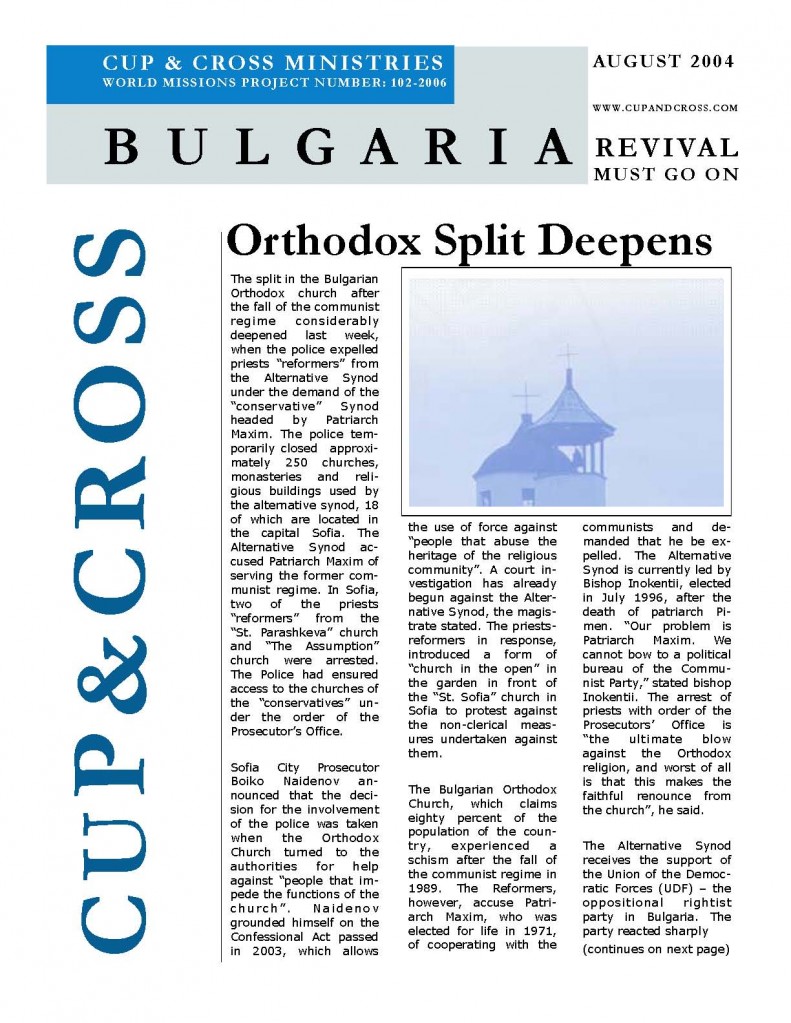Orthodox Split Deepens
Orthodox Split Deepens
The split in the Bulgarian Orthodox church after the fall of the communist regime considerably deepened last week, when the police expelled priests “reformers” from the Alternative Synod under the demand of the “conservative” Synod headed by Patriarch Maxim. The police temporarily closed approximately 250 churches, monasteries and religious buildings used by the alternative synod, 18 of which are located in the capital Sofia. The Alternative Synod accused Patriarch Maxim of serving the former communist regime. In Sofia, two of the priests “reformers” from the “St. Parashkeva” church and “The Assumption” church were arrested. The Police had ensured access to the churches of the “conservatives” under the order of the Prosecutor’s Office.
Sofia City Prosecutor Boiko Naidenov announced that the decision for the involvement of the police was taken when the Orthodox Church turned to the authorities for help against “people that impede the functions of the church”. Naidenov grounded himself on the Confessional Act passed in 2003, which allows the use of force against “people that abuse the heritage of the religious community”. A court investigation has already begun against the Alternative Synod, the magistrate stated. The priests-reformers in response, introduced a form of “church in the open” in the garden in front of the “St. Sofia” church in Sofia to protest against the non-clerical measures undertaken against them.
The Bulgarian Orthodox Church, which claims eighty percent of the population of the country, experienced a schism after the fall of the communist regime in 1989. The Reformers, however, accuse Patriarch Maxim, who was elected for life in 1971, of cooperating with the communists and demanded that he be expelled. The Alternative Synod is currently led by Bishop Inokentii, elected in July 1996, after the death of patriarch Pimen. “Our problem is Patriarch Maxim. We cannot bow to a political bureau of the Communist Party,” stated bishop Inokentii. The arrest of priests with order of the Prosecutors’ Office is “the ultimate blow against the Orthodox religion, and worst of all is that this makes the faithful renounce from the church”, he said.
The Alternative Synod receives the support of the Union of the Democratic Forces (UDF) – the oppositional rightist party in Bulgaria. The party reacted sharply and strongly condemned the acts of the police, considering the lack of court decision for the actions. “This is not the way the wholeness of the Bulgarian Orthodox church should be restored”, commented former President of Bulgaria Petar Stoyanov. According to him, such acts will only deepen the conflict between the Orthodox Christians in Bulgaria. “Our main concern is the wholeness of the church. Patriarch Maxim is waiting for the stretched hands of the repented (reformers) to go back to the House of God”, said Father Nikolay, one of the “conservators”. State authorities, in its turn, are continuing to perform the role of a conciliator even after Bulgaria Prime Minister Simeon Saxe-Coburg-Gotha swore to the Cross and the Gospel in the presence of Patriarch Maxim when he was sworn in at the position of prime Minister in 2001. The same did the newly elected Bulgarian President Georgi Parvanov in January 2002.








